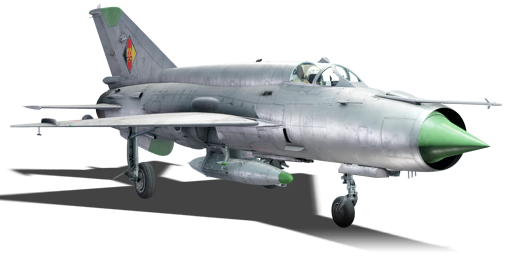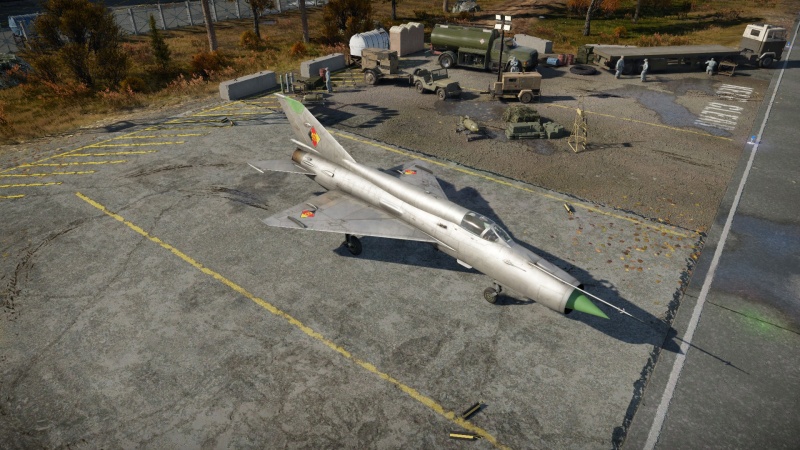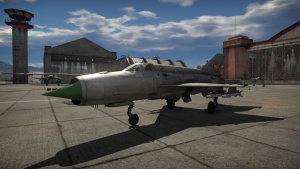Difference between revisions of "MiG-21MF (Germany)"
m (→Details: Corrected optimal velocities values) |
m (→Usage in battles: Added a radar table) |
||
| Line 173: | Line 173: | ||
* F-4E/F-4EJ. They are armed with great missiles, fighting them at altitude is not recommended. One the deck they are faster and have better energy retention. | * F-4E/F-4EJ. They are armed with great missiles, fighting them at altitude is not recommended. One the deck they are faster and have better energy retention. | ||
* J35 Draken, will always outturn you. It is very important to keep an energy advantage when attempting to fight the Draken, turn fighting is the worst thing possible against a Draken and tactics that involve retaining energy is best when attempting to fight the Draken. Forcing the Draken to dump its energy is the best way to fight against it. | * J35 Draken, will always outturn you. It is very important to keep an energy advantage when attempting to fight the Draken, turn fighting is the worst thing possible against a Draken and tactics that involve retaining energy is best when attempting to fight the Draken. Forcing the Draken to dump its energy is the best way to fight against it. | ||
| + | |||
| + | ===Radars=== | ||
| + | <!--{{main|AN/APS-19}}--> | ||
| + | The MiG-21MF is equipped with a RP-21 Sapfir search and tracking radar. The radar is mounted in the nose of the aircraft. | ||
| + | |||
| + | {| class="wikitable" style="text-align:center" | ||
| + | ! colspan="4" | RP-21 - Target Detection Radar | ||
| + | |- | ||
| + | ! {{Annotation|Maximum<br/>Detection<br/>Range|The maximum possible range at which a target can be detected}} | ||
| + | ! {{Annotation|Guaranteed<br/>Detection<br/>Range|The range, below which, detection of a target is practically guaranteed}} | ||
| + | ! {{Annotation|Max Azimuth<br/>Scan Angle|How far to each side the radar can scan (widest search mode)}} | ||
| + | ! {{Annotation|Max Elevation<br/>Scan Angle|How far up and down the radar can scan (widest search mode)}} | ||
| + | |- | ||
| + | | 30,000 m<br />(theoretical) || 20,000 m || ±30.0° || -3.0°/+17.0° | ||
| + | |- | ||
| + | ! colspan="4" | RP-21 - Target Tracking Radar | ||
| + | |- | ||
| + | ! {{Annotation|Maximum<br/>Tracking<br/>Range|The maximum range at which a target can be tracked}} | ||
| + | ! {{Annotation|Minimum<br/>Tracking<br/>Range|The range below which targets cannot be tracked by the radar}} | ||
| + | ! {{Annotation|Azimuth Tracking<br/>Angle|How far to each side the radar can track a target}} | ||
| + | ! {{Annotation|Elevation Tracking<br/>Angle|How far up and down the radar can track a target}} | ||
| + | |- | ||
| + | | 20,000 m || 300 m || ±30.0° || ±17.0° | ||
| + | |- | ||
| + | |} | ||
=== Pros and cons === | === Pros and cons === | ||
Revision as of 19:14, 15 March 2021
| This page is about the German jet fighter MiG-21MF (Germany). For other versions, see MiG-21 (Family). |
Contents
Description
The ◊MiG-21MF is a rank VII German jet fighter with a battle rating of 10.3 (AB) and 10.7 (RB/SB). It was introduced in Update 1.95 "Northern Wind".
It is a single-engine delta-wing supersonic interceptor with conventional tail and fully-moving elevators. As of Update "Hot Tracks", it is the only German plane able to carry air-to-air missiles better than AIM-9B/R-3, the only plane with ballistic computer, and the only plane above BR 10.0.
General info
Flight performance
The ◊MiG-21MF has mediocre flight performance in every aspect among top rank jets. It will get out-accelerated by British Phantoms or MiG-21 bis, outturned by Draken or Mirage, and out-sped by 2nd gen US Phantoms (F-4E/EJ), Starfighters or MiG-21 bis. The delta wing provides great angle-of-attack (AoA) while turning but it also mean the plane loses huge amount of speed doing so. This means that staying behind enemy in 1 vs. 1 is fairly simple, but when there are multiple bandits one might loose all their speed and become an easy missile target if turning too much.
| Characteristics | Max Speed (km/h at 13,000 m) |
Max altitude (metres) |
Turn time (seconds) |
Rate of climb (metres/second) |
Take-off run (metres) | |||
|---|---|---|---|---|---|---|---|---|
| AB | RB | AB | RB | AB | RB | |||
| Stock | 2,196 | 2,178 | 16000 | 34.0 | 35.1 | 139.6 | 131.0 | 750 |
| Upgraded | 2,295 | 2,240 | 32.3 | 33.0 | 192.8 | 165.0 | ||
Details
| Features | |||||
|---|---|---|---|---|---|
| Combat flaps | Take-off flaps | Landing flaps | Air brakes | Arrestor gear | Drogue chute |
| X | ✓ | ✓ | ✓ | X | ✓ |
| Limits | ||||||
|---|---|---|---|---|---|---|
| Wings (km/h) | Gear (km/h) | Flaps (km/h) | Max Static G | |||
| Combat | Take-off | Landing | + | - | ||
| 1365 | 700 | N/A | 524 | 450 | ~12 | ~6 |
| Optimal velocities (km/h) | |||
|---|---|---|---|
| Ailerons | Rudder | Elevators | Radiator |
| < 650 | < 600 | < 950 | N/A |
Engine performance
| Engine | Aircraft mass | |||||
|---|---|---|---|---|---|---|
| Engine name | Number | Empty mass | Wing loading (full fuel) | |||
| Tumansky R-13-300 | 1 | 5,860 kg | 355 kg/m2 | |||
| Engine characteristics | Mass with fuel (no weapons load) | Max Takeoff Weight | ||||
| Weight (each) | Type | 8m fuel | 20m fuel | 29m fuel | ||
| 1,135 kg | Afterburning axial-flow turbojet | 6,505 kg | 7,455 kg | 8,168 kg | 9,900 kg | |
| Maximum engine thrust @ 0 m (RB / SB) | Thrust to weight ratio @ 0 m (WEP) | |||||
| Condition | 100% | WEP | 8m fuel | 20m fuel | 29m fuel | MTOW |
| Stationary | 3,825 kgf | 6,483 kgf | 1.00 | 0.87 | 0.79 | 0.65 |
| Optimal | 3,825 kgf (0 kph) |
6,977 kgf (1,200 kph) |
1.07 | 0.94 | 0.85 | 0.70 |
Survivability and armour
The MiG-21MF lacks armor plating. It also has one engine unlike some other planes. This means that the survivability is very low, even among jets. Getting hit is something that should be avoided at all cost, because should the plane survive it, even small wing damage will force the pilot to return to base. The plane lacks radar warning receiver (RWR), which is a notable downside compared to the Soviet MiG 21 SMT.
Modifications and economy
Your main priority is to get to the R-60s as soon as possible, this will require you to unlock two tier III modifications. Unless you particularly want to research the ground attack ordinance you will be wanting to unlock "Wings repair" and "New 23 mm cannons". Therefore if you want to reach the R-60s in the shortest time possible you should research "New 23 mm cannons" as your first modification. This will then unlock tier II modifications where you can research "R-3S" and your choice of "New boosters" or "Airframe"; it is up to you in which order you unlock these, it may be appealing to unlock missiles first to help with the grind but you should keep in mind that the R-3S missiles are nearly useless (they are slightly worse than the AIM-9B and can only be fired when pulling less than 2G, which means they cannot be fired in even a gentle turn or climb). Once tier III modifications are amiable unlock "Wings repair" and "New 23 mm cannons" in whichever order you want, then go for the R-60s. Once the R-60s are unlocked you can unlock the remaining modifications in whatever order you see fit, however it is recommended to go for G-suit and engine upgrades first.
Armaments
Offensive armament
The MiG-21MF (Germany) is armed with:
- 1 x 23 mm GSh-23L cannon, belly-mounted (200 rpg)
Suspended armament
The MiG-21MF (Germany) can be outfitted with the following ordnance:
- Without load
- 64 x S-5K rockets
- 96 x S-5K rockets
- 4 x S-24 rockets
- 4 x R-3S missiles
- 4 x R-60 missiles
- 64 x S-5K rockets + 2 x R-3S missiles
- 64 x S-5K rockets + 2 x R-60 missiles
- 2 x S-24 rockets + 2 x R-3S missiles
- 2 x S-24 rockets + 2 x R-60 missiles
- 4 x 250 kg OFAB-250sv bombs (1,000 kg total)
- 2 x 250 kg OFAB-250sv bombs + 2 x R-3S missiles (500 kg total)
- 2 x 250 kg OFAB-250sv bombs + 2 x R-60 missiles (500 kg total)
The ◊MiG-21MF has access to ballistic computer for the guns and rockets.
Usage in battles
While the ◊MiG-21MF itself is a pretty mediocre fighter, it has access to 4 deadly R-60 missiles. These missiles work the best when enemy is slow, so the recommended tactic is to wait a bit before engaging into the battle.
Due to the immense speed bleed in turns, it is strongly recommended to keep the speed high near enemies, unless one really wants to closely meet AIM-9J. Dropping below 800 km/h makes it really hard to dodge this missile. When an enemy is spotted, it is recommended to turn roughly into their direction, so when they engage, they'll have to make a 180° turn, which will give time for MiG pilot to disengage without risking getting hit by a missile.
Engaging in 1 v 1 situation can sometimes be done, but unless a faster opponent forces it (which happens rarely, as faster opponents turn worse than the MiG) it is only recommended if there are no other enemies nearby. However, do never turn-fight with Draken or Mirage. A good tactic for defensive dogfights is trying to make enemy overshoot, especially against Phantoms. Keep in mind however that you can outrun F-4C.
Final thing to note is that because the plane has no RWR nor radar-guided missiles, it is strongly recommended to stick close to the ground. This will make it unable for enemies to track you on their radar and send a radar-guided missile. This strategy comes with a risk of having to deal with enemies that are higher than you, but without RWR the pilot won't even know if there is a missile coming towards him.
Specific enemies worth noting
- MiG-21 bis and MiG-21 SMT, if you play against the Soviets. They are faster and have better acceleration (bis in particular) but are slightly heavier and less agile
- Mirage IIIC, has very similar acceleration and top speed, but will outturn MiG-21 MF and has great Matra Magic missiles.
- F-4E/F-4EJ. They are armed with great missiles, fighting them at altitude is not recommended. One the deck they are faster and have better energy retention.
- J35 Draken, will always outturn you. It is very important to keep an energy advantage when attempting to fight the Draken, turn fighting is the worst thing possible against a Draken and tactics that involve retaining energy is best when attempting to fight the Draken. Forcing the Draken to dump its energy is the best way to fight against it.
Radars
The MiG-21MF is equipped with a RP-21 Sapfir search and tracking radar. The radar is mounted in the nose of the aircraft.
| RP-21 - Target Detection Radar | |||
|---|---|---|---|
| Maximum Detection Range |
Guaranteed Detection Range |
Max Azimuth Scan Angle |
Max Elevation Scan Angle |
| 30,000 m (theoretical) |
20,000 m | ±30.0° | -3.0°/+17.0° |
| RP-21 - Target Tracking Radar | |||
| Maximum Tracking Range |
Minimum Tracking Range |
Azimuth Tracking Angle |
Elevation Tracking Angle |
| 20,000 m | 300 m | ±30.0° | ±17.0° |
Pros and cons
Pros:
- Access to four R-60 missiles with great tracking and G-tolerance
- High AoA
- Good ground attack loadouts
- Light and agile
- A small profile which is harder to hit
- Decent fuel load allows for reheating for the whole match
Cons:
- Jack of all trades, but a master of none
- Terrible cannon armament
- Terrible energy retention
- No Radar Warning Receiver
- No combat flaps
History
The MiG-21MF (Germany) is a second-generation variant of the popular MiG-21 'Fishbed'. Operated by the East German Air Force (Luftstreitkräfte der Nationalen Volksarmee; LSK) between 1972 and 1990, the aircraft was an export variant of the MiG-21SM, and is highly similar to its counterpart, the MiG-21SMT. Designated the 'Fishbed-J', the aircraft formed the bulk of the LSK in the late stages of the Cold War. All German MiG-21 aircraft were retired following the German Reunification, though some survive as museum aircraft to this day.[1][2]
Design and procurement
The East German Air Force received many MiG-21 variants due to their ties with the Soviet Bloc. 76 MiG-21F-13 aircraft had been delivered to the East German Air Force in the early 1960s, and they later received 50 MiG-21PF 'Fishbed-D' planes, which were known as the MiG-21PFM in East German service.[1] This generated considerable confusion as the German MiG-21PFs had inadvertently been given the same name as the later, Soviet-made, MiG-21PFM 'Fishbed-F'.[1] However, in the early 1970s, the LSK received its first 3rd-generation MiG-21s, the MiG-21MF. This aircraft was essentially an export variant of the Soviet MiG-21SM. 50 MiG-21MFs were delivered to the LSK between 1972 and 1974.[1]
The MiG-21MF differs from the standard MiG-21SM by having a less powerful engine and simplified radar system, meaning that it accelerates slightly slower than its Soviet counterpart. It could reach a maximum speed of 2,230 km/h, and was flown by a single pilot.[2] As an interceptor, it carried a 23 mm dual-barreled cannon with 200 rounds in a ventral pack, and was also capable of fitting a variety of munitions including bombs, rockets and missiles.[1]
Service history
The MiG-21MF enjoyed a fairly uneventful service history with the LSK. The aircraft served with Jagdgeschwader (JG, fighter group) 8 and JG 9. It complemented the earlier MiG-21PFM and MiG-21F-13 aircraft in German service. Later on, it was complemented by the MiG-21bis, the final MiG-21 variant to serve with the German Air Force. At the time of the German reunification, many MiG-21s remained in German service.[1][2] As the new combined Luftwaffe had no plans to continue using the Soviet-era interceptor, all MiG-21 aircraft were retired in late 1990 following the German reunification. Many of those aircraft were reserved as museum pieces, and several survive to this day in museums across the globe.[2]
Media
- Skins
- Images
- Videos
See also
- Related development
External links
- [Wikipedia] Mikoyan-Gurevich MiG-21
- [Air Vectors] The Mikoyan MiG-21 - MiG-21 Single-Seat Variants
- Official data sheet - more details about the performance
References
Works Cited
- Aviata. (2020). German MiG-21. Retrieved November 23, 2020, from https://aviatia.net/german-mig-21/
- Museum, D. (2020). Mikojan-Gurewitsch MiG-21 MF. Retrieved November 23, 2020, from https://www.deutsches-museum.de/en/flugwerft/collections/jet-aircraft/mig-21/
| Mikoyan-Gurevich Design Bureau (Микоя́н и Гуре́вич Опытное конструкторское бюро) | |
|---|---|
| Fighters | MiG-3-15 · MiG-3-15 (BK) · MiG-3-34 |
| I-225 | |
| Jet fighters | MiG-9 · MiG-9 (l) |
| MiG-15 · MiG-15bis · MiG-15bis ISh | |
| MiG-17 | |
| MiG-19PT | |
| MiG-21F-13 · MiG-21PFM · MiG-21S (R-13-300) · MiG-21SMT · MiG-21bis | |
| MiG-23M · MiG-23ML · MiG-23MLD | |
| MiG-27M · MiG-27K | |
| MiG-29 · MiG-29SMT | |
| Export/Licensed | ␗MiG-9 · ␗MiG-9 (l) |
| ◊MiG-15bis · ◔MiG-15bis · J-2* | |
| MiG-17AS · ◔MiG-17PF · J-4* · Shenyang F-5* | |
| ◊MiG-19S · J-6A* | |
| ◄MiG-21 SPS-K · ◊MiG-21MF · ◔MiG-21MF · ▄MiG-21bis · ◔MiG-21bis-SAU · ◊MiG-21bis-SAU · ◊MiG-21 "Lazur-M" · ▄MiG-21 Bison · J-7II** | |
| ◊MiG-23BN · ◊MiG-23MF · ◔MiG-23MF · ◊MiG-23MLA | |
| ◔MiG-29 · ◊MiG-29 · ◄MiG-29G | |
| *Licensed and domesticated with Chinese designations. | |
| **Unlicensed, reverse-engineered and domesticated with Chinese designations. | |
| See Also | Shenyang · Chengdu |
| Germany jet aircraft | |
|---|---|
| |
Luftwaffe |
| He 162 | He 162 A-1 · He 162 A-2 |
| Me 163 | Me 163 B · Me 163 B-0 |
| Ho 229 | Ho 229 V3 |
| Ar 234 | Ar 234 B-2 · Ar 234 C-3 |
| Me 262 | Me 262 A-1a · Me 262 A-1a/Jabo · Me 262 A-1a/U1 · Me 262 A-1/U4 · Me 262 A-2a |
| Me 262 C-1a · Me 262 C-2b | |
| |
LSK |
| Fighters | ◊MiG-15bis · ◊Lim-5P · ◊MiG-19S |
| ◊MiG-21MF · ◊MiG-21bis-SAU · ◊MiG-21 "Lazur-M" | |
| ◊MiG-29 | |
| Attackers | ◊MiG-23BN · ◊MiG-23MF · ◊MiG-23MLA |
| ◊Su-22UM3K · ◊Su-22M4 | |
| ◊IL-28 | |
| |
Luftwaffe |
| F-84 | ◄F-84F |
| F-86 | ◄CL-13A Mk 5 · ◄CL-13B Mk.6 · ◄F-86K |
| F-104 | ◄F-104G |
| F-4 | ◄F-4F Early · ◄F-4F · ◄F-4F KWS LV |
| G.91 | ◄G.91 R/3 · ◄G.91 R/4 |
| Tornado | ◄Tornado IDS WTD61 · ◄Tornado IDS MFG · ◄Tornado IDS ASSTA1 |
| Other | Alpha Jet A · ◄Sea Hawk Mk.100 |
| Ex-LSK | ◄MiG-21 SPS-K · ◄MiG-29G · ◄Su-22M4 WTD61 |
| |
Swiss Air Force |
| ◌Hunter F.58 · FFA P-16 | |






